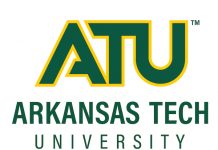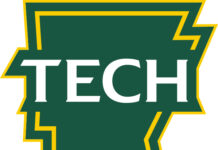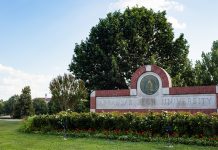The name Wonder Boys has carried special meaning at Arkansas Tech University since it was first used as a proper noun in print 98 years ago this weekend.
But what is the true story of how that nickname came to be associated with Arkansas Tech?
Edgar O. Brown was coming off an undefeated season as the football coach at Central College in Fayette, Mo., when he was called by President Hugh Critz in 1920 to come to Russellville and build the Second District Agricultural School (as Arkansas Tech was then known) into a football powerhouse.
Brown led the 1920 Second District Agri School team (photographed) to early-season wins over the schools now known as Southern Arkansas (52-6) and Central Arkansas (49-0). Brown’s Russellville Aggies also played Hendrix and the University of Arkansas freshman team to scoreless ties, giving them a record of 2-0-2 at the close of October.
It all set the stage for Nov. 5, 1920, and a showdown in Russellville between the Second District Agri School and Little Rock College (now known as the University of Arkansas at Little Rock).
Henry Loesch, the sports editor for the Arkansas Gazette, made the trip west with the Little Rock College team.
The Russellville Aggies won the game 14-7, prompting Loesch to describe the Second District Agri School as a “newcomer apparently destined to become a feared rival in intercollegiate athletics in Arkansas.”
Loesch was especially impressed with Second District Agri School quarterback John Tucker. Loesch wrote the following words about the Second District Agri School captain in the Nov. 6, 1920, edition of the Arkansas Gazette:
Now for the rest of the story that Russellville asked for; for the introduction of a super player and for the details of his performance. Russellville knows who we mean, by sections the rest of Arkansas is being acquainted with him — fans, friends and the Ouachita Tigers, if you ever meet the Russellville Farmers look out for Capt. John Tucker. Look out for him before he starts, for once he is on his way brick buildings, rock walls and other immovable bodies but slightly impede his progress.
The husky captain, he weighs a neat 180, did not have a corner on the Russellville punch and he did not play the game alone, there are other men in the Aggie backfield who smash with terrific force and who are equal to the role of individual star, but this Tucker is so good that he makes the rest of them look bad. He’s so good that it is hard to see any one else on the entire field.
With that, the statewide legend of John Tucker was born.
The Second District Agri School remained undefeated with one game remaining on its 1920 schedule — a contest in Arkadelphia against Henderson-Brown College (now known as Henderson State University) on the afternoon of Tuesday, Nov. 16.
The Arkansas Gazette published three articles previewing the game.
The first, on Nov. 14, 1920, described the Russellville Aggies as “the wonder team of the 1920 football drama in Arkansas.”
Then, on Nov. 15, 1920, the Second District Agri School team is referred to as “the wonder team of the year.”
And finally, on Nov. 16, 1920, in the game day preview, the team is referred to as “the wonder boys of Arkansas football.”
The season-ending clash at Henderson-Brown College was a scoreless tie at halftime. The Second District Agri School went deep into the playbook during the third quarter for a fake punt executed by Tucker that led to the first score of the day.
Glenn Kerr plowed over the goal line from four yards out to give the Russellville Aggies a 6-0 lead.
Tucker scored on a 20-yard touchdown run early in the fourth quarter and then set the Second District Agri School’s final margin of victory by making the extra point. The Aggies led 13-0 and went on to a shutout victory.
Loesch was in Arkadelphia for the game. The next day, on Nov. 17, 1920, the headline of his article in the Arkansas Gazette used Wonder Boys as a proper noun in reference to the Second District Agri School football team for the first time ever.
The headline read: Russellville Winner in Tight Game with Reddies; Wonder Boys’ Victory Delayed Until Second Half by Wonderful Defensive Work of Henderson-Brown Players — Score, 13 to 0.
If that was the end of the story, John Tucker would certainly deserve a special place in Arkansas Tech history. But there is much more.
Tucker played for the Wonder Boys through the 1923 season and accumulated an insurmountable school-record total of 443 career points scored. No other Tech player has ever scored more than 260 career points — All-America running back Eddie Meador amassed that figure from 1955-58 and place kicker Eric Perez matched him with 260 points from 2014-17.
From 1920-23, Tucker led the Wonder Boys to a cumulative record of 25-2-3. Their only losses during that span were to the University of Tulsa (1922) and Army (1923).
The end of Tucker’s playing career was merely the beginning of his service to Arkansas Tech. He went on to work at the school in a variety of roles — including coach, teacher, athletic director and director of student affairs — between 1925 and 1972.
Tucker took a brief sabbatical from Tech to attend the University of Alabama, where he played on the Crimson Tide team that defeated Washington State 24-0 in the 1931 Rose Bowl.
He came back to serve as head coach for the Wonder Boys football team from 1933-41 and again from 1945-47. He won 77 games and five Arkansas Intercollegiate Conference championships as Tech head football coach. His .791 winning percentage still stands as the best of any head football coach in school history.
Today, two buildings on the Arkansas Tech campus — Tucker Hall and Tucker Coliseum — are named in his honor. He entered the Arkansas Sports Hall of Fame in 1962 and he was part of the first class inducted into the Arkansas Tech Hall of Distinction in 1965.
Tucker is best remembered as the “Original Wonder Boy.” But there is much more to that title of honor than the points he scored and the victories he captured.
His work on the field of play, in the classroom and in student services stands as a shining example of the balanced college experience that Arkansas Tech still offers its students today.
That is why he is still remembered as the “Original Wonder Boy” more than nine decades after he scored his last touchdown.
And that is why in 1965, toward the end of Tucker’s lifelong association with Arkansas Tech, the Agricola yearbook was dedicated in his honor and these words were written about him:
If you are a relative Johnny-Come-Lately, and are not closely connected with Arkansas Tech, then John Tucker may be just a name to you — a name dropped in awe by people who saw him as a football player, or who watched his teams from one to two decades later. If you are now or ever have been a student of chemistry at Arkansas Tech, the name John Tucker is synonymous with excellent instruction.
John Tucker has proven to be a most capable leader of youth, and has been and still is, loved and respected by all who know him.





